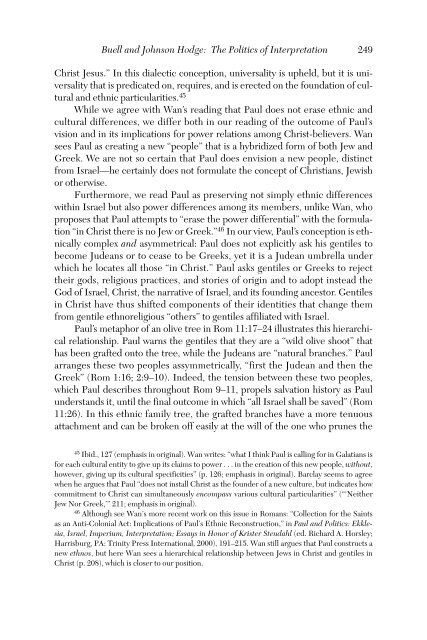Journal of Biblical Literature - Society of Biblical Literature
Journal of Biblical Literature - Society of Biblical Literature
Journal of Biblical Literature - Society of Biblical Literature
Create successful ePaper yourself
Turn your PDF publications into a flip-book with our unique Google optimized e-Paper software.
Buell and Johnson Hodge: The Politics <strong>of</strong> Interpretation 249<br />
Christ Jesus.” In this dialectic conception, universality is upheld, but it is universality<br />
that is predicated on, requires, and is erected on the foundation <strong>of</strong> cultural<br />
and ethnic particularities. 45<br />
While we agree with Wan’s reading that Paul does not erase ethnic and<br />
cultural differences, we differ both in our reading <strong>of</strong> the outcome <strong>of</strong> Paul’s<br />
vision and in its implications for power relations among Christ-believers. Wan<br />
sees Paul as creating a new “people” that is a hybridized form <strong>of</strong> both Jew and<br />
Greek. We are not so certain that Paul does envision a new people, distinct<br />
from Israel—he certainly does not formulate the concept <strong>of</strong> Christians, Jewish<br />
or otherwise.<br />
Furthermore, we read Paul as preserving not simply ethnic differences<br />
within Israel but also power differences among its members, unlike Wan, who<br />
proposes that Paul attempts to “erase the power differential” with the formulation<br />
“in Christ there is no Jew or Greek.” 46 In our view, Paul’s conception is ethnically<br />
complex and asymmetrical: Paul does not explicitly ask his gentiles to<br />
become Judeans or to cease to be Greeks, yet it is a Judean umbrella under<br />
which he locates all those “in Christ.” Paul asks gentiles or Greeks to reject<br />
their gods, religious practices, and stories <strong>of</strong> origin and to adopt instead the<br />
God <strong>of</strong> Israel, Christ, the narrative <strong>of</strong> Israel, and its founding ancestor. Gentiles<br />
in Christ have thus shifted components <strong>of</strong> their identities that change them<br />
from gentile ethnoreligious “others” to gentiles affiliated with Israel.<br />
Paul’s metaphor <strong>of</strong> an olive tree in Rom 11:17–24 illustrates this hierarchical<br />
relationship. Paul warns the gentiles that they are a “wild olive shoot” that<br />
has been grafted onto the tree, while the Judeans are “natural branches.” Paul<br />
arranges these two peoples assymmetrically, “first the Judean and then the<br />
Greek” (Rom 1:16; 2:9–10). Indeed, the tension between these two peoples,<br />
which Paul describes throughout Rom 9–11, propels salvation history as Paul<br />
understands it, until the final outcome in which “all Israel shall be saved” (Rom<br />
11:26). In this ethnic family tree, the grafted branches have a more tenuous<br />
attachment and can be broken <strong>of</strong>f easily at the will <strong>of</strong> the one who prunes the<br />
45 Ibid., 127 (emphasis in original). Wan writes: “what I think Paul is calling for in Galatians is<br />
for each cultural entity to give up its claims to power . . . in the creation <strong>of</strong> this new people, without,<br />
however, giving up its cultural specificities” (p. 126; emphasis in original). Barclay seems to agree<br />
when he argues that Paul “does not install Christ as the founder <strong>of</strong> a new culture, but indicates how<br />
commitment to Christ can simultaneously encompass various cultural particularities” (“‘Neither<br />
Jew Nor Greek,’” 211; emphasis in original).<br />
46 Although see Wan’s more recent work on this issue in Romans: “Collection for the Saints<br />
as an Anti-Colonial Act: Implications <strong>of</strong> Paul’s Ethnic Reconstruction,” in Paul and Politics: Ekklesia,<br />
Israel, Imperium, Interpretation; Essays in Honor <strong>of</strong> Krister Stendahl (ed. Richard A. Horsley;<br />
Harrisburg, PA: Trinity Press International, 2000), 191–215. Wan still argues that Paul constructs a<br />
new ethnos, but here Wan sees a hierarchical relationship between Jews in Christ and gentiles in<br />
Christ (p. 208), which is closer to our position.

















